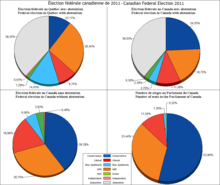| Part of the Politics series |
| Voting |
|---|
|
|

Abstention is a term in election procedure for when a participant in a vote either does not go to vote (on election day) or, in parliamentary procedure, is present during the vote but does not cast a ballot.[1] Abstention must be contrasted with "blank vote", in which a voter casts a ballot willfully made invalid by marking it wrongly or by not marking anything at all. A "blank voter" has voted, although their vote may be considered a spoilt vote, depending on each legislation, while an abstaining voter has not voted. Both forms (abstention and blank vote) may or may not, depending on the circumstances, be considered to be a protest vote (also known as a "blank vote"). Abstention is related to political apathy and low voter turnout.
An abstention may be used to indicate the voting individual's ambivalence about the measure, or mild disapproval that does not rise to the level of active opposition. Abstention can also be used when someone has a certain position about an issue, but since the popular sentiment supports the opposite, it might not be politically expedient to vote according to their conscience. A person may also abstain when they do not feel adequately informed about the issue at hand, or have not participated in relevant discussion. In parliamentary procedure, a member may be required to abstain in the case of a real or perceived conflict of interest.[2][3]
Abstentions do not count in tallying the vote negatively or positively; when members abstain, they are in effect attending only to contribute to a quorum. Instead, blank votes may be counted in the total of votes, depending on the legislation.
- ^ "Frequently Asked Questions about RONR (Question 6)". The Official Robert's Rules of Order Web Site. The Robert's Rules Association. Retrieved 9 October 2023.
- ^ Hernandez, Raymond; Drew, Christopher (7 December 2007). "It's Not Just 'Ayes' and 'Nays': Obama's Votes in Illinois Echo". The New York Times. Retrieved 9 October 2023.
- ^ "Frequently Asked Questions about RONR (Question 9)". The Official Robert's Rules of Order Web Site. The Robert's Rules Association. Retrieved 9 October 2023.